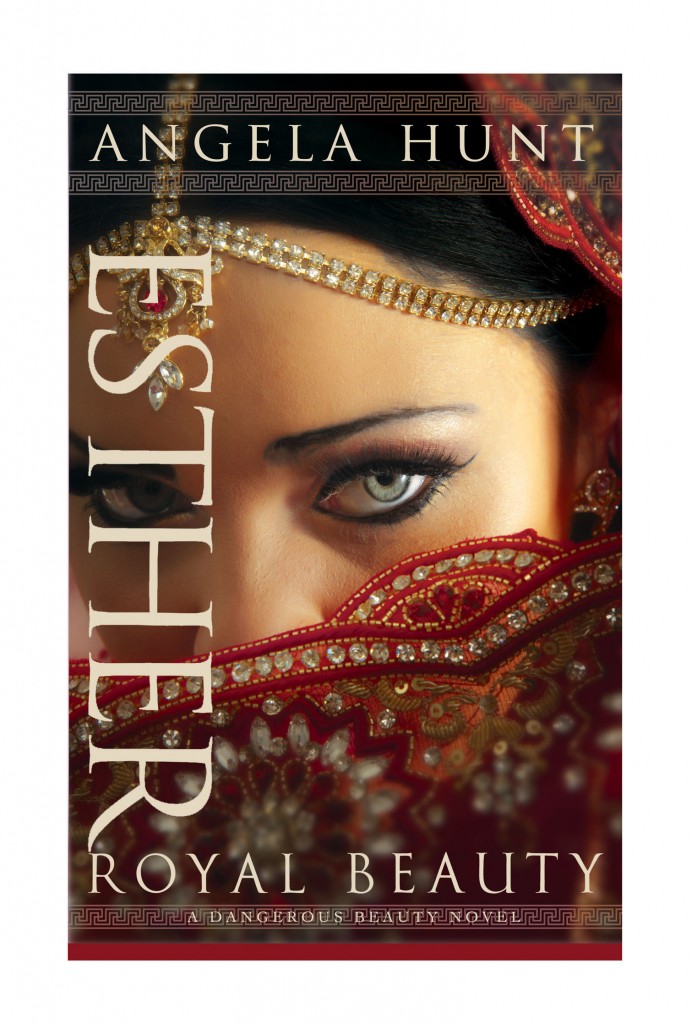The story of Esther is one of the most fascinating stories in the Bible. It is the fairy tale of the Old Testament—a classic rags to riches story of an ordinary girl who becomes queen of her country after winning a beauty pageant. Several authors have already explored this story through fiction, but I was excited to see Angela Hunt’s new book Esther: Royal Beauty.
“You may think you know me, but how could you? Others have related my story, and most of them paint a pretty picture. But unless a woman is allowed to speak for herself, no one will ever fully understand the events of a lifetime… and the secret recesses of a woman’s heart.”
The first in Hunt’s Dangerous Beauty series, Esther has the accurate historical details and page-turning suspense I expect from any Angela Hunt novel. The story is told in first-person narrative by Esther (or Hadassah) and Harbonah, one of the palace eunuchs. I enjoyed the back-and-forth between these two characters, as Harbonah was able to give more details that Esther wouldn’t have known, preserving the innocence of her character throughout the novel.
The story opens with Hadassah as an impressionable young girl in Susa, the capital city of the Persian empire. While other Jewish girls are preparing to become wives and mothers, Hadassah dreams of something more—especially after her chance encounter with Queen Vashti. Hadassah’s friendship with a neighbouring Persian girl encourages her worldly dreams. When King Xerxes throws a banquet for his citizens, Hadassah is delighted to check out the palace. Then Xerxes releases his famous decree, starting an empire-wide search for a new queen.
In the palace, Hadassah soon earns the respect of Harbonah and the other eunuchs. An old friend of Mordecai’s, Harbonah watches over Hadassah and connects her with her cousin. Yet Hadassah grows to enjoy her new life in the palace and, on her night with the king, falls in love with him. She soon forgets her cousin, her people, her faith. She works to win the love of her husband’s children and to keep him happy. Yet sadness plagues her as she suffers multiple miscarriages, and that sadness pushes her away from Xerxes.
Then a newcomer arrives in the Persian court: Haman, a man with wealth enough to buy his way into the royal circles, where his quick-talking and flattery soon make him a favourite with the king. Harbonah watches Haman’s rise to power with concern, yet everyone else seems to like Haman—except Mordecai. Mordecai’s actions provoke Haman to deeper and deeper anger, until he finally has enough clout with the king to ask for the slaughter of the Jewish people.
In my own attempts to write historical fiction, and to tell a story when the plot and characters are already set, I’ve come to deeply respect other writers of historical fiction. All the way through this novel, I was amazed by the way that Hunt drew me in Esther’s character. While we know the plot details of the story, Hunt creates an emotional plot for Esther, adding an extra layer of tension and authenticity to this ancient story.
Angela Hunt is the author of more than one hundred books, both fiction and nonfiction, including Five Miles South of Peculiar, The Offering, and The Fine Art of Insincerity. She has a doctorate in Biblical studies and is currently completing her Th.D. In her spare time, she takes pictures of shelter dogs.

No Responses Yet